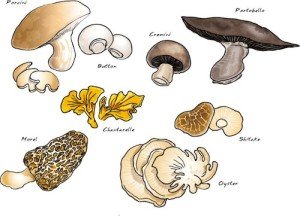Putting the Fun in Fungi
Let’s talk about fungi that grow from spores in the darkness.* Mushrooms may seem unassuming, but all shapes, sizes, and types are popular on plates worldwide. From the white button mushrooms that make up 90 percent of the mushrooms eaten by Americans** to wild truffles, mushrooms play a huge role in a wide range of cuisines. There are nine varieties – white button, shiitake, wild (i.e. truffles, morels, and chanterelles), maitake, beech, oyster, portabella, crimini, and enoki.Mushrooms are not called “nature’s hidden treasure” for nothing – they offer a powerhouse of good-for-you nutrients. Since they are devoid of chlorophyll, you won’t see a green mushroom – however that doesn’t stop them from offering your body some powerful defenses. Most types of mushrooms are rich in antioxidants like selenium and ergothioniene. They offer a variety of B-vitamins (like niacin and riboflavin), and are jam-packed with potassium. Remember potassium? It’s a mineral that helps regulate blood pressure. Many varieties of mushrooms also contain soluble fiber. The shiitake mushroom contains the soluble beta-glucan fiber, lentinan, which is good for boosting the immune system, fighting infection, and preventing some cancers. Also, mushrooms are fat-free and low in calories. A single serving has between 18 to 37 calories, depending on the type of mushroom.From a culinary perspective, mushrooms can be roasted, sautéed, broiled, baked, pureed, sliced, or stuffed. With meatless meals at the forefront for health right now, mushrooms are the perfect vegetable to enhance vegetarian meals. They offer a meaty taste and texture to a variety of vegetarian dishes. Global cuisines highlight mushrooms in their favorite dishes from Mexican quesadillas and fajitas to Spanish paella to French mushroom crepes, bisques and quiches, to Chinese stir fries to Italian chicken Marsala, mushrooms appear on menus in every corner of the world. Notes:* Well, some are exposed to ultraviolet rays, which offers a dose of vitamin D.** According to www.mushroominfo.com.*** For more information on mushrooms, check out my book, The Essential Guide to Healthy Healing Foods or visit the Mushroom Channel at www.mushroominfo.com.By Victoria Shanta Retelny, RD, LDN, author of The Essential Guide to Healthy Healing Foods.
Notes:* Well, some are exposed to ultraviolet rays, which offers a dose of vitamin D.** According to www.mushroominfo.com.*** For more information on mushrooms, check out my book, The Essential Guide to Healthy Healing Foods or visit the Mushroom Channel at www.mushroominfo.com.By Victoria Shanta Retelny, RD, LDN, author of The Essential Guide to Healthy Healing Foods.